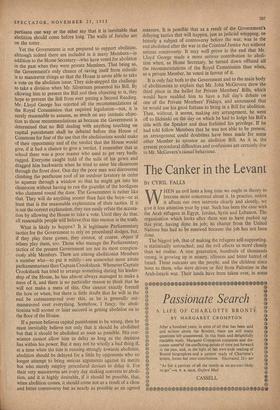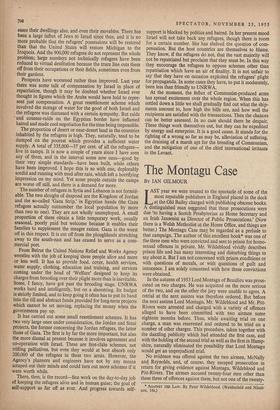The Canker in the Levant
BY CYRIL FALLS WHEN an evil lasts a long time we ought in theory to become more concerned about it. In practice, unless it affects our own interests clearly and closely, we give it less attention year by year. Such has been the case with the Arab refugees in Egypt, Jordan, Syria and Lebanon. The organisation which looks after them was to have packed up this year, having done its job; its charter from 'the United Nations has had to be renewed because the job has not been done.
The biggest job, that of making the refugees self-supporting. is statistically untouched; and the evil affects us more closely than we realise. A new generation, hundreds of thousands strong, is growing up in misery, idleness and bitter hatred of Israel. These outcasts are the people, and the children since born to them, who were driven or fled from Palestine in the Arab-Israeli war. Their lands have been taken over, in some cases their dwellings also, and even their movables. There has been a large influx of Jews to Israel since then, and it is no more probable that the refugees' possessions will be restored than that the United States will restore Michigan to the Iroquois. And the 900,000 refugees do not represent the whole problem; large numbers not technically refugees have been reduced to virtual destitution because the truce line cuts them off from their occupations or their fields, sometimes even from their gardens.
Prospects have worsened rather than improved. Last year there was some talk of compensation by Israel in place of repatriation, though it may be doubted whether Israel ever thought in figures which the Arabs would have held to repre- sent just compensation. A great resettlement scheme which involved the storage of water for the good of both Israel and the refugees was discussed with a certain sympathy. But raids and counter-raids on the Egyptian border have inflamed hatred and made cool negotiation for the time being impossible.
The proportion of desert or near-desert land in the countries inhabited by the refugees is high. They, naturally, tend to be dumped on the poorest which provides a sufficient water supply. A total of 335,000-37 per cent. of all the refugees— live in camps. It is now a couple of years since I have seen any of them, and in the interval some new ones—good by their very simple standards—have been built, while others have been improved. I hope this is so with one, deplorably sordid and running with mud after rain, which left a horrifying impression on my mind. Yet some people outside the camps are worse off still, and there is a demand for more.
The number of refugees in Syria and Lebanon is not formid- able. The two sloughs of despond are the Kingdom of Jordan and the so-called 'Gaza Strip,' in Egyptian hands (the Gaza refugees actually outnumber the local population by more than two to one). They are not wholly unemployed. A small proportion of them obtain a little temporary work, usually seasonal, poorly paid but welcome because it enables their families to supplement the meagre ration. Gaza is the worst off in this respect. It is cut off from the ploughlands stretching away to the south-east and has ceased to serve as a com- mercial port.
From Beirut the United Nations Relief and Works Agency wrestles with the job of keeping these people alive and more or less well. It has to provide food, cover, health services, water supply, clothing, education and training, and services coming under the head of 'Welfare' designed to keep its charges from brooding over their plight more than is inevitable.
Some, I fancy, have got past the brooding stage. UNRWA works hard and intelligently, but on a shoestring. Its budget is strictly limited, and to keep going it often has to put its hand into the till and abstract funds provided for long-term projects which cannot be set moving, replacing the money when the governments pay up.
It has carried out some small resettlement schemes. It has two very large ones under consideration, the Jordan and Sinai projects, the former concerning the Jordan refugees, the latter those of Gaza. The first is by far the more important, but also the more dismal at present because it involves agreement and co-operation with Israel. These are first-class schemes, not trifling palliatives, but even they would at best absorb only 200,000 of the refugees in these two areas. However, the Agency's planners and engineers have not by any means scraped out their minds and could turn out more schemes if it were worth while.
There, then, is the record—fine work on the day-to-day job of keeping the refugees alive and in human guise; the goal of self-support as far off as ever. And progress towards self- support is blocked by politics and hatred. In her present mood Israel will not take back any refugees, though there is room for a certain number. She has shelved the question of com- pensation. But the host countries are themselves to blame. They know, if the refugees do not, that the vast majority will not be repatriated but proclaim that they must be. In this way they encourage the refugees to oppose schemes other than repatriation which have an air of finality. It is not unfair to say that they have on occasion exploited the refugees' plight for propaganda. In some cases they have, to put it moderately, been less than friendly to UNRWA.
At the moment, the influx of Communist-produced arms has spread excitement over the whole region. When this has settled down 'a little we shall gradually find out what the ship- ments amount to, how high the bills are, and how well the recipients are satisfied with the transactions. Then the chances can be better assessed. In no case should there be despair. These things work themselves out, but they can be expedited by energy and enterprise. It is a good cause. It stands for the righting of a wrong so far as may be, alleviation of suffering, the draining of a marsh apt for the breeding of Communism, and the mitigation of one of the chief international irritants in the Levant.



























































 Previous page
Previous page